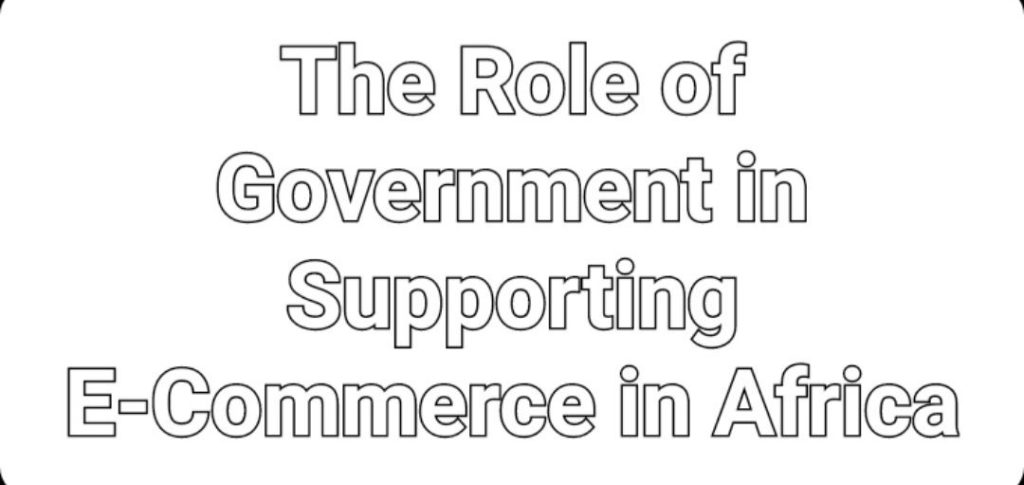The Role of Government in Supporting E-Commerce in Africa
The rapid growth of e-commerce in Africa is one of the most exciting developments in the global digital economy. With a young, tech-savvy population, increasing internet penetration, and a burgeoning middle class, the continent is poised to become a major player in the online retail space. However, for e-commerce to reach its full potential in Africa, governments must play a proactive role in creating an enabling environment.

1. Building Digital Infrastructure
One of the most significant barriers to e-commerce in Africa is the lack of reliable digital infrastructure. Many regions still struggle with poor internet connectivity, limited access to smartphones, and unreliable electricity. Governments can address these challenges by investing in broadband infrastructure, expanding mobile network coverage, and promoting affordable internet access. Public-private partnerships can also be leveraged to accelerate the rollout of digital infrastructure, ensuring that even rural areas are connected.
2. Creating a Favorable Regulatory Environment
E-commerce thrives in an environment where regulations are clear, fair, and supportive of innovation. Governments need to establish legal frameworks that protect consumers, promote fair competition, and encourage cross-border trade. This includes enacting data protection laws, addressing cybersecurity concerns, and simplifying tax regulations for online businesses. By creating a predictable and transparent regulatory environment, governments can attract both local and foreign investment in the e-commerce sector.
3. Promoting Digital Literacy and Skills Development
For e-commerce to flourish, consumers and businesses must be equipped with the necessary digital skills. Governments can play a pivotal role in promoting digital literacy through education and training programs. Initiatives such as coding boot camps, online business workshops, and digital skills certifications can empower entrepreneurs and small businesses to leverage e-commerce platforms effectively. Additionally, integrating digital literacy into school curricula can prepare the next generation for the digital economy.
4. Supporting Payment Systems and Financial Inclusion
The success of e-commerce is closely tied to the availability of secure and convenient payment systems. In many African countries, cash-on-delivery remains the dominant payment method due to low levels of financial inclusion and trust in online payments. Governments can support the growth of e-commerce by promoting digital payment solutions such as mobile money, QR codes, and online banking. Collaborating with fintech companies to develop innovative payment solutions and ensuring interoperability between different platforms can further enhance the e-commerce ecosystem.
5. Encouraging Cross-Border E-Commerce
Cross-border e-commerce presents a significant opportunity for African businesses to access global markets. However, complex customs procedures, high tariffs, and logistical challenges often hinder trade. Governments can facilitate cross-border e-commerce by simplifying customs processes, reducing trade barriers, and investing in regional logistics hubs. Additionally, joining regional trade agreements and harmonizing e-commerce regulations across borders can create a seamless trading environment.
6. Fostering Innovation and Startups
Startups and small businesses are the backbone of Africa’s e-commerce ecosystem. Governments can support these entrepreneurs by providing access to funding, mentorship, and incubation programs. Establishing innovation hubs and technology parks can create a collaborative environment where startups can thrive. Furthermore, offering tax incentives and grants for e-commerce businesses can encourage innovation and growth in the sector.
7. Ensuring Consumer Protection
Trust is a critical factor in the success of e-commerce. Consumers need to feel confident that their personal information is secure and that they will receive the products or services they paid for. Governments can build trust by enforcing consumer protection laws, establishing dispute resolution mechanisms, and promoting transparency in online transactions. Public awareness campaigns can also educate consumers about their rights and how to shop safely online.
8. Leveraging Data for Policy Making
Data is a powerful tool for understanding the e-commerce landscape and identifying areas for improvement. Governments can collaborate with e-commerce platforms, research institutions, and industry stakeholders to collect and analyze data on online trade. This data-driven approach can inform policy decisions, helping governments design targeted interventions that address the specific needs of the e-commerce sector.
Conclusion
The growth of e-commerce in Africa has the potential to transform economies, create jobs, and improve livelihoods. However, realizing this potential requires a concerted effort from governments to address the challenges facing the sector. By investing in digital infrastructure, creating supportive regulatory frameworks, and fostering innovation, governments can unlock the full potential of e-commerce in Africa. The time to act is now—by working together, governments, businesses, and consumers can build a thriving digital economy that benefits all.
What are your thoughts on the role of governments in supporting e-commerce in Africa? Share your insights in the comments below!
![IMG_20250312_021609_811[1] The Role of Government in Supporting E-Commerce in Africa](https://www.saalime.com/wp-content/uploads/2025/03/IMG_20250312_021609_8111.jpg)
Very good https://lc.cx/xjXBQT
Awesome https://urlr.me/zH3wE5